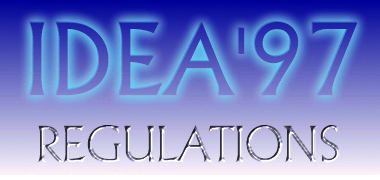|
IDEA-PART B FINAL REGULATIONS*
REGULAR EDUCATION TEACHERS AS IEP TEAM
MEMBERS
(March 1999)
Regular Education Teacher on IEP Team Is Required by IDEA
'97.
The final Part B regulations incorporate the
requirements of IDEA '97 regarding regular education teachers in the
IEP process, including specifying that --
- The IEP team for each child with a disability must include at
least one regular education teacher of the child (if the child is,
or may be, participating in the regular education environment)
(see §300.344(a)(2)); and
- The teacher must, to the extent appropriate, participate in
the development, review, and revision of the child's IEP,
including –
- the determination of appropriate positive behavioral
interventions and strategies for the child, and
- the determination of supplementary aids and services,
program modifications, and supports for school personnel that
will be provided for the child consistent with the IEP content
requirements in §300.347(a)(3). (See §300.346(e))
Other School Staff May Not Be Substituted for the Reg. Ed.
Teacher.
Some commenters on the NPRM suggested that other
school staff (e.g. a special education teacher or a counselor) be
substituted for the regular education teacher at IEP meetings.
Adopting that suggestion would be inconsistent with the Act, and
would undermine the new focus of IDEA '97 -- on improving results
for children with disabilities through participation in the regular
education environment and in the general curriculum. Thus, the
regular education teacher who serves on the IEP team should be the
teacher who is, or may be, responsible for implementing a portion of
the IEP, so that the teacher can participate in discussions about
how best to teach the child. (See Q-26 in Appendix A -- the Notice
of Interpretation on IEPs.)
Extent To Which Reg. Ed. Teacher Must Be Physically Present at
IEP Meeting.
While at least one regular education teacher of
a child with a disability must be a member of the IEP team (if the
child is, or may be, participating in the regular education
environment), the LEA need not require the teacher to -- (1)
participate in all decisions made as part of the meeting, or
(2) be present at all meetings or throughout an entire meeting, as
described below:
- THE TEACHER WOULD PARTICIPATE IN DISCUSSIONS ABOUT the child's
involvement and progress in the general curriculum and
participation in the regular education environment (as well as
discussions about the supplementary aids and supports for teachers
and other school staff that are necessary to ensure the child's
progress in that environment).
- THE TEACHER NEED NOT PARTICIPATE IN DISCUSSIONS about
certain other matters in the IEP meeting (e.g., the physical
therapy needs of the child -- if the teacher is not responsible
for implementing that portion of the child's IEP).
- WHETHER THE TEACHER MUST BE PHYSICALLY PRESENT AT EACH
MEETING, and the extent to which the teacher must participate in
all phases of the IEP process are matters that must -- (1) be
determined on a case by case basis by the public agency, the
parents, and the other members of the IEP team, and (2) be based
on a variety of factors. (See analysis of comments on
§300.344(a)(2) in Attachment 1, and Q-24 of Appendix A.)
Children With Disabilities Who Have More Than One Reg. Ed.
Teacher.
The substance of the note following §300.344 in the
NPRM (related to the participation of regular education teachers on
the IEP team) has been incorporated into the Notice of
Interpretation on IEPs (Appendix A) and in the "Analysis of
Comments..." (Attachment 1 to the final regulations), as follows:
- ONLY ONE TEACHER REQUIRED ON IEP TEAM; BUT OTHERS MAY ATTEND.
If a child with a disability has more than one regular
education teacher, only one of the teachers is required to be on
the IEP team. However, if the participation of more than one of
the teachers would be beneficial to the child's success in school
(e.g., in terms of enhancing the child's participation in the
general curriculum), it may be appropriate under the Act and
regulations for them to be members of the team and
participate.
LEA MAY DESIGNATE WHICH TEACHER ON IEP TEAM.
If a child
has more than one regular education teacher, the LEA may designate
which teacher or teachers will be on the IEP team.
INPUT FROM CHILD'S OTHER TEACHERS.
In a situation in which
all of the child's regular education teachers are not members of
the IEP team, the LEA is strongly encouraged to seek input from
the teachers who will not be attending. (See Q-26 of Appendix A.)
Child's Teachers Must Have Access to IEP and Be Informed of their
Responsibilities.
A new §300.342(b)(2) (entitled
"Implementation of IEPs") has been added to the regulations to
specify that each public agency must ensure that --
- THE IEP OF EACH CHILD WITH A DISABILITY IS ACCESSIBLE to each
regular education teacher (as well as each special education
teacher, related service provider, and other service provider) who
is responsible for implementing the IEP; and
- EACH TEACHER AND PROVIDER IS INFORMED OF -- (A) his or her
specific responsibilities related to implementing the IEP, and (B)
the specific accommodations, modifications, and supports that must
be provided to the child in accordance with the IEP.
Mechanism for Informing Staff at Discretion of Agency.
The above requirement is necessary to ensure proper
implementation of the child's IEP and the provision of FAPE to the
child. However, the mechanism that the public agency uses to inform
each teacher or provider of his or her responsibilities is left to
the discretion of the agency.
* On October 22, 1997, a Notice of Proposed Rulemaking (NPRM) was
published in the Federal Register to amend the
regulations under Part B of the Individuals with Disabilities
Education Act (IDEA). The purposes of the NPRM were to implement
changes made by the IDEA Amendments of 1997, and make other changes
that facilitate the implementation of Part B. The changes made since
the NPRM are based mainly on public comments
received. |


